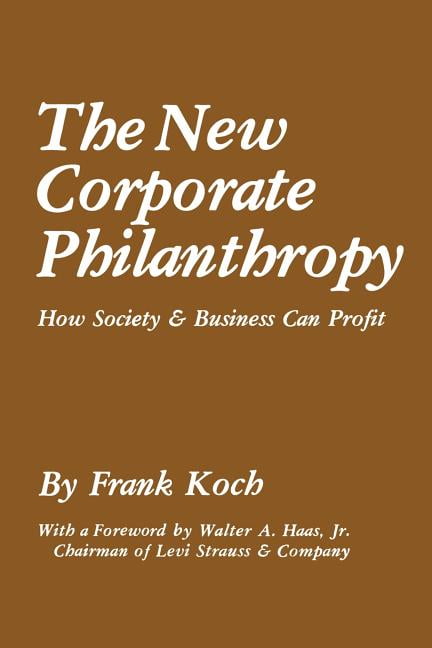Why Business Philanthropy Issues: A Guide to Business Social Responsibility
Company philanthropy acts as a crucial part of business social duty. It reflects a business's devotion to societal concerns and enhances its public picture. Services participating in kind efforts frequently see improved employee morale and stronger area connections. Nevertheless, real impact of these efforts can be diverse and intricate. Recognizing the subtleties of corporate philanthropy can illuminate its importance in today's organization landscape. What are the vital variables that drive its success?
The Definition of Company Philanthropy
Corporate philanthropy refers to the charitable contributions and campaigns carried out by services to support social causes and community development. This concept encompasses a variety of activities, including monetary contributions, worker volunteer programs, and in-kind gifts of services or products. Companies participate in philanthropy to attend to social problems such as education and learning, healthcare, environmental sustainability, and destitution alleviation.
Normally, corporate philanthropy is structured through official programs or collaborations with nonprofit organizations, allowing organizations to take advantage of their sources properly. These efforts commonly aim to make a favorable effect on the community while aligning with the business's worths and mission. Additionally, company philanthropy reflects a commitment to company social obligation, showcasing how companies can add to society past revenue generation. By taking part in kind efforts, companies can play a substantial duty in fostering social adjustment and attending to community needs.
Benefits of Company Philanthropy for Companies
Engaging in corporate philanthropy offers countless advantages for organizations, enhancing their reputation and cultivating stronger area ties. Business that actively take part in philanthropic efforts often experience raised employee spirits and loyalty. When employees perceive their company as socially accountable, they are much more likely to really feel happy with their workplace, causing greater degrees of job satisfaction and retention.
In addition, corporate philanthropy can produce useful networking opportunities. Collaborating with non-profits and neighborhood companies allows services to get in touch with similar individuals and teams, possibly resulting in collaborations that can benefit both celebrations. Furthermore, services participated in philanthropy might find themselves much more attractive to investors and stakeholders who prioritize ethical techniques.
Ultimately, business philanthropy not just sustains societal needs however likewise offers concrete advantages to organizations, creating a win-win situation that promotes growth and sustainability while adding positively to the world.
Enhancing Brand Commitment With Social Obligation
Enhancing brand name loyalty via social obligation entails structure trust fund with consumers by straightening business actions with area values (corporate philanthropy). Companies can promote deeper connections with neighborhood involvement initiatives that reverberate with their target audience. Furthermore, authentic brand name storytelling can better reinforce commitment by showcasing authentic dedication to social causes
Building Depend On With Action
Building depend on with activity is an effective method that companies can apply to strengthen brand commitment and foster deeper connections with customers. When services proactively engage in corporate philanthropy, they demonstrate a commitment to ethical practices and social obligation. This positive strategy not just enhances their online reputation yet likewise reverberates with consumers who focus on values positioning. Openness in humanitarian efforts is crucial; companies must properly connect their campaigns and the influence they are making. Credibility plays a considerable duty also; customers are more probable to support brand names that genuinely appreciate societal problems as opposed to those that take part in surface advertising. Inevitably, by prioritizing purposeful activities over plain words, companies can support long-lasting trust and commitment among their customer base.
Neighborhood Involvement Efforts

Authentic Brand Storytelling
Area involvement campaigns usually act as a foundation for genuine brand name narration, which plays a substantial role in growing brand commitment. By sharing real stories about their social obligation efforts, business can link mentally with customers. These stories highlight the brand name's worths, objective, and commitment to societal enhancement, promoting trust fund and relatability. When customers regard a brand as socially responsible, they are more probable to create a deeper fondness and choice for it. Authentic storytelling likewise encourages openness, welcoming customers to engage with the brand on an individual level. Consequently, services not just boost their reputation yet additionally build long lasting partnerships with their audience, ultimately leading to increased commitment and campaigning for in an open market
The Function of Workers in Company Philanthropy
Staff members play an important role fit a business's humanitarian efforts with their engagement and engagement. Effective staff member engagement methods can boost volunteerism, causing meaningful area impact. As companies harness the collective power and enthusiasm of their labor force, they can cultivate a society of giving that extends past the office.
Worker Interaction Methods
Interaction in business philanthropy fosters a feeling of purpose that prolongs past simple profit-making. Firms can improve staff member involvement by implementing numerous techniques that urge participation in humanitarian efforts. One reliable approach is to establish a coordinating gift program, where the company matches employee donations to qualified charities, intensifying their effect. In addition, routine interaction about philanthropic initiatives can create understanding and influence employees to contribute their time and sources. Supplying systems for staff members to share their philanthropic interests fosters a sense of ownership and area. Recognizing and awarding staff members for their kind payments can likewise enhance a culture of giving, inevitably resulting in a much more involved labor force aligned with the firm's social obligation objectives.
Volunteerism and Community Influence
Company philanthropy prospers when individuals proactively take part in volunteerism, straight influencing the communities they offer. Staff member participation in volunteer campaigns not only enhances firm society however also fosters a feeling of objective and link among personnel. Via volunteering, employees create crucial abilities, such as synergy and leadership, which can translate right into boosted task this hyperlink performance. Additionally, when staff members unite for community causes, they reinforce their bond with the organization, boosting total morale and loyalty. Organizations that urge volunteerism commonly see a favorable public photo, as neighborhood engagement mirrors their dedication to social responsibility. Inevitably, the cumulative impact of staff member volunteer efforts can change neighborhoods, dealing with pushing social issues while strengthening company worths and mission.

Determining the Impact of CSR Initiatives
As companies significantly purchase business social obligation (CSR) efforts, comprehending their impact comes to be necessary for examining performance and directing future initiatives. Determining the impact of CSR calls for a complex strategy, integrating both qualitative and quantitative metrics. Trick efficiency indicators (KPIs) such as area interaction degrees, worker fulfillment, and environmental enhancements provide beneficial insights right into the results of CSR programs. Studies and interviews with stakeholders can disclose the social change created by these efforts, while information analysis assists track progress against established objectives.
In addition, aligning CSR objectives with company purposes enhances responsibility. Organizations can use frameworks such as the Worldwide Coverage Campaign or the UN Sustainable Development Goals to systematize their dimension processes. Inevitably, precise assessment of CSR initiatives not only shows a firm's dedication to social responsibility but likewise educates technique modifications to make the most of positive effect, promoting a society of sustainability and community involvement.
Best Practices for Implementing Efficient CSR Methods
Applying effective CSR strategies needs a clear understanding of a company's goals and values, ensuring alignment with stakeholder expectations. Successful business begin by carrying out a complete analysis of their social, ecological, and financial influences, permitting them to determine areas for enhancement. Stakeholder interaction is important; organizations should actively entail staff members, consumers, and community members in the development and implementation of CSR campaigns.
Openness is an additional best practice, as it cultivates trust fund and liability. Firms need to interact their CSR goals and progress honestly, sharing both difficulties and successes. Furthermore, integrating CSR right into the core service strategy enhances its influence, making it an essential component of procedures instead of an afterthought. Routine evaluation and adjustment of CSR efforts, informed by stakeholder feedback and transforming societal demands, assurance significance and efficacy. By sticking to these practices, companies can produce purposeful and lasting CSR techniques that reverberate with their communities.
Regularly Asked Questions
Just How Can Local Business Take Part In Corporate Philanthropy?
Small companies can get involved in business philanthropy by giving away a percent of earnings, funding local events, partnering with nonprofits, using employee volunteer days, and taking part in community service tasks, cultivating a positive effect and boosting their brand online reputation.
What Prevail False Impressions Concerning Business Philanthropy?
Common mistaken beliefs regarding company philanthropy include the idea that it's exclusively an advertising and marketing tool, that More Help only big firms can participate, which it lacks genuine impact. Lots of take too lightly the value local business can add via purposeful engagement.
How Do Customers Perceive Firms Involved in Philanthropy?
Customers commonly view firms taken part in philanthropy favorably, connecting such initiatives with business obligation, honest habits, and community support. This perception can enhance brand commitment, influence getting choices, and enhance overall corporate credibility in the market.
Exist Tax Obligation Benefits for Companies Entailed in Philanthropy?
Businesses associated with philanthropy usually appreciate numerous tax advantages, such as reductions for charitable contributions. corporate philanthropy. These motivations can improve a firm's economic standing while promoting a favorable public picture with their neighborhood involvement efforts
Can Corporate Philanthropy Improve Employee Retention Fees?
Business philanthropy click here for more can boost staff member retention rates by fostering a feeling of function and belonging among personnel. Engaged staff members, lined up with firm values, are more probable to remain fully commited and pleased within their duties.
Business philanthropy offers as a necessary component of corporate social responsibility. Corporate philanthropy refers to the charitable payments and initiatives taken on by companies to support social reasons and area growth. Additionally, company philanthropy reflects a dedication to corporate social obligation, showcasing exactly how organizations can contribute to culture past revenue generation. Involving in corporate philanthropy offers countless benefits for businesses, improving their reputation and promoting more powerful area connections. Consumers usually see business involved in philanthropy positively, connecting such initiatives with corporate obligation, ethical habits, and community support.